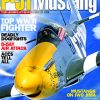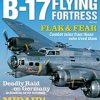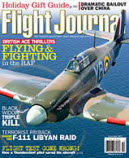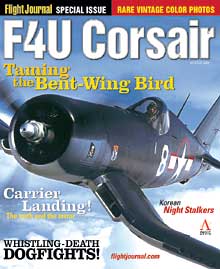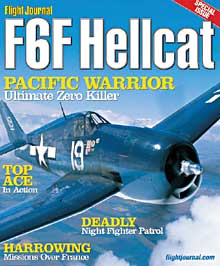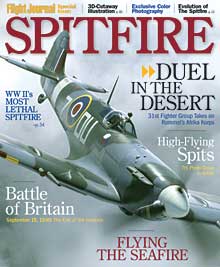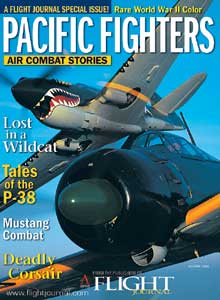B-24 Liberator
$7.99
| A Look at the Liberator The Genesis of the USAAF’s Most Produced Aircraft Warren Bodie Historian Warren Bodie takes us through a detailed tour of the Liberator’s rapid evolutions from a pre-war concept to one of the most valuable bombing platforms in the world. He gives us the inside information on what was changed and why, while heavily illustrating the variations from his world famous photographic library. | |
Liberator Ghosts of Tonopah Traniing Accidents took their toll Frederick Johnsen The average age of a bomber crew was barely more than 20 years old with the occasional pilot being 22 or 24. They went through flight training and a few months later were being tasked with learning to fly one of the most powerful bombers in the world. There was a Darwinesque aspect to the training that left wreckage scattered for the ages around ex-training command bases like Tonopah, Nevada. Author Frederick Johnsen details the harrowing, often lethal aspects of Liberator training and chronicles the re-discovery of some of the crash sites. | |
Flying Eight Ball A pilot’s pilot helps out the Swiss James Busha His B-24 is a flying piece of junk after being hammered by flak and fighters. Capt. Robert Cardenas’ Liberator managed to limp into Switzerland but barely made the German side of the lake when he had to bail out. Not willing to be a POW, he swam the mile across the lake thinking he’d spend the rest of the war in a lounge chair, but the Swiss had another idea. They pressed him into service to teach their pilots how to fly the many B-24s that had landed on their territory. His story is a unique one. | |
Just Plane Luck Surviving had nothing to do with skill Jan Tegler Robert Beatson was a B-24 navigator at a time when the bombers were being hammered especially hard. They were going after pre-invasion targets deep inside the continent and their only protection was each other. Beatson gives us a terrifying up-close look at what it was like to be savagely attacked, severely wounded and then limp back to England alone. | |
First Raid to Blechhammer Escaping and evading in southwest Slovakia Peter Kassak July 7, 1944, bombardier 2nd Lt. Neal Cobb boarded his bomber ready to fly with 185 other B-24s to attack the refineries in which is now Blachownia Slaskia, Poland, then known as Blechhammer-north. He couldn’t know that they would be shot down and they would spend the next months hiding from the Germans as he went from partisan band to partisan band until finally being rescued in a most unexpected way. | |
Dogfighting and Ditching in the B-24 A Liberator can fight, but it isn’t a boat Frederick Johnsen We generally think of B-24s in huge gaggles blanketing the sky with high-altitude contrails, but we seldom think of them dogfighting with German bombers as if they were fighters. However, such combat often took place between lone USAAF B-24s flying anti-submarine patrols when they encountered their counterparts: the four-engine FW 200 Condor or, in the Pacific, the Kawanishi “”Emily”” Flying boat. Going as low as 25 feet, the gunners on board the two aircraft would seek the advantage with the pilots doing their best to close the distance and give their gunners firing position. The outcome was never certain. | |
Return Trip Through Hell A lucky Liberator crew survives a head-on attack Richard Smart T/Sgt. Richard Smart stood in the waist window and watched what seemed to be an endless stream of Bf 109s close in on his B-24. The bomber’s target had been Politz, Germany, oil refineries, but now, with their bomb run completed, Smart’s bomber became the target as the Messerschmitt’s cannon shells found its mark. Trailing smoke and barely flying, the airplane limps home, its crew praying the 109s are done with them. | |
Sub Hunter Supreme The saga of Liberator AM929 Alfred Price A number of the early LB-30s acquired by the British were specially outfitted with 20mm cannons and depth charge racks to turn them into sub hunters. That early in the war, the U-boats threatened to strangle England, but the Liberator sub hunters proved to be quite effective with none more so than AM929, which scored two kills and damaged numerous other subs. Author Price opens the window in a little known chapter of Liberator history. | |
Fate, Luck &Faith A true story of praying for survival Forrest Clark As he stood in the rear hatch of his badly damaged B-24 looking down at the ocean barely 500 feet below, tail gunner Forest Clark said one last prayer: that the pack of Bf 109s on their tail would lose interest and let them live. Even as he prayed, a layer of clouds came under them giving his pilot a place to hide. His prayers had been answered and they survived. | |
Bravery in the Skies Liberator crewmen go above and beyond Barrett Tillman During WW II, 53 Americans were awarded the Medal of Honor for aerial actions that were above and beyond the call of duty. Nine flew B-24s, six died in the process and another did not live to receive his award. Noted historian/author Barrett Tillman tells the stories of these heroes. |


